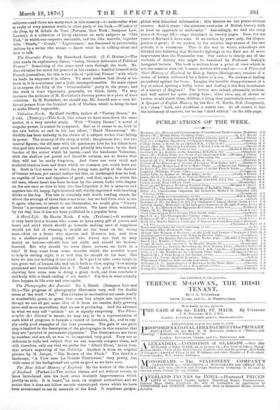The New School History of England. By the Author of
the Annals of England. (Parker.)—The author claims, and not without reason, to have introduced into his book some desirable improvements which justify its title. It is based,.he says, on original authorities, and we notice that it does not follow certain stereotyped views which we have been accustomed to see in manuals of the kind. It combines geogra- subjects—and there are many such in this country—to undervalue what phical with historical information ; this feature we can praise without reserve. And it treats "the nineteen centuries of British history with .at least an approach to uniformity." Accordingly, we find the sixty years of George III.'s reign dismissed iu twenty pages. Now, the ten years of Richard I. have nine. If we reckon by years only, the dispro- portion is great ; if we reckon by the relative importance of the two periods, it is enormous. This is the way in which schoolboys are deluded into believing that Richard's fightings in the East are of more importance than the Peninsular war. Our author is clearly one of the students of history who might be benefited by Professor Seeley's inaugural lecture. The book is written from a point of view which is not the same as ours, but it seems written with candour.--A Plain and Short History of England by Bishop Davys (Rivingtons), consists of a series of letters addressed by a father to a son. We confess to feeling prejudiced against the form. Imagine the horrible disappointment of a boy at school opening a bulky letter and finding it the first instalment of a history of England ! The letters are, indeed, pleasantly written, and well suited for quite young boys ; older ones, say, of eleven or twelve, would think them childish, a thing they particularly resent. -- A Synopsis of English History, by the Rev. G. Bartle, D.D. (Longman), is a " cram " book, and doubtless a useful one. At all events, it has the testimony of success, for we see "third edition" on the title-page.








































 Previous page
Previous page